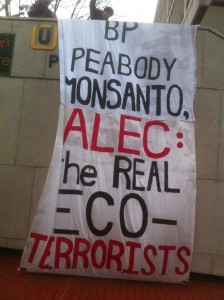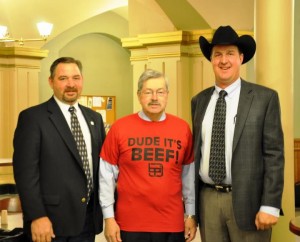“Ag Gag” bills targeting undercover investigators of factory farms have been introduced in 10 states in the last year. The nearly identical legislation is no coincidence. The bills, and their supporters, have ties to the American Legislative Exchange Council.
The Ag Gag bills parallel other national efforts by ALEC, such as “Stand Your Ground” legislation, in that they have been promulgated through model legislation, carefully coordinated task forces, and the ability to mobilize ALEC members for key votes. Whereas many ALEC efforts have remained focused on the state legislation, ALEC’s coordinated attacks on the animal rights and environmental movement have also contributed to the passage of a new federal terrorism law.
Model Legislation
The primary tool used by ALEC is model legislation. Corporations pay thousands of dollars to be members of the group, and in turn they draft model bills which are introduced across the country, all without other lawmakers and the public having any idea of their origins.
One of ALEC’s model bills is the “Animal and Ecological Terrorism Act.” The bill is so broad that it classifies non-violent civil disobedience by environmental and animal rights activists as terrorism.
The model bill is tailored to address local issues, and has appeared across the country in various forms since it was drafted in 2003. For example, when it was introduced in Washington state the sponsors focused on “terrorists” who take part in tree sits and non-violent road blockades.
The purpose of this and other model legislation is not necessarily for it to be introduced verbatim: it is to present a “wish list” of legislative language from which state lawmakers can pick and choose to satisfy their constituents. For example, the model bill spells out penalties for undercover investigators that are lockstep with the new “Ag Gag” bills, such as prohibitions against:
(b) entering an animal or research facility that is at the time closed to the public;
(c) remaining concealed in an animal or research facility with the intent to commit an act prohibited by this chapter;
(d) entering an animal or research facility and committing or attempting to commit an act prohibited by this chapter;
(e) entering an animal or research facility to take pictures by photograph, video camera, or other
means with the intent to commit criminal activities or defame the facility or its owner;
(f) entering or remaining on the premises of an animal or research facility if the person or organization:
(i) had notice that the entry was forbidden; or,
(ii) received notice to depart but failed to do so.
These provisions are the heart of every Ag Gag bill. In some cases, identical legislation has appeared in multiple states. For example, Missouri’s HB 1860 says:
A person commits the crime of agricultural production facility fraud if he or she willfully obtains access to an agricultural production facility by false pretenses or knowingly makes a false statement or misrepresentation as part of an application for employment at an agricultural production facility with the intent to commit an act not authorized by the owner.
Compare this to Iowa’s HF 589, which is the same text with a new format:
1. A person is guilty of agricultural production facility fraud if the person willfully does any of the following:
a. Obtains access to an agricultural production facility by false pretenses.
b. Makes a false statement or representation as part of an application or agreement to be employed at an agricultural production facility, if the person knows the statement to be false, and makes the statement with an intent to commit an act not authorized by the owner of the agricultural production facility, knowing that the act is not authorized.
ALEC’s model legislation originates from what it calls “task forces.” One of these is the “Energy, Environment and Agriculture Task Force.” Every state where an Ag Gag bill has been introduced, except for New York, has members of this task force:
- Florida (2)
- Illinois (2)
- Indiana (3)
- Iowa (9)
- Minnesota (1)
- Missouri (3)
- New York (0)
- Tennessee (4)
- Utah (3)
Securing Sponsors and Votes
The secrecy of ALEC makes it difficult to know the extent to which any legislation is derived from a model bill. And when they are introduced, lawmakers and the general public have no idea if the sponsor is an ALEC member. Thanks to the document leaks of the Center for Media and Democracy, a long list of verified ALEC members has emerged.
Even from the limited list, it is clear that ALEC members have been absolutely critical to introducing, sponsoring, and bloc voting for Ag Gag bills across the country. Here are a few states where ALEC’s power has been on display:
Minnesota
In Minnesota, House File 1369 was introduced to criminalize production of an “image or sound†of animal suffering in a sweeping list of “animal facilities,†including factory farms, animal experimentation labs, and puppy mills.
The sponsors? Four of the seven are affiliated with ALEC. Rep. Paul Anderson (R-13A), Rep. Steve Drazkowski, and Rep. Connie Doepke are all ALEC members, and Rep. Dean Urdahl denies membership but has said he will introduce ALEC model bills.
Utah
Utah was the second state to approve legislation targeting undercover investigators. HB 187, “Agricultural Operation Interference,” was introduced by the House Law Enforcement and Criminal Justice Committee, and was originally so sweeping that it made videotaping a factory farm the same as assaulting a police officer.
When the bill came to the full Utah House for a vote, 14 of the 60 yea votes were from known ALEC members. Two of them, Rep. Roger Barrus and Rep. Rebecca Lockhart, are members of the ALEC Energy, Environment and Agriculture Task Force.
When the Utah Senate approved the bill, 13 of the 24 yeas were from ALEC members.
Tennessee
In Tennessee, the “Ag Gag” bill was introduced by Sen. Dolores R. Gresham, an ALEC task force member.
When it was being considered by the Tennessee Senate, 4 of the 6 votes in favor came from ALEC members.
Iowa: ALEC’s Influence on Display
Iowa was the first state to pass one of the recent “Ag Gag” bills. The Iowa Poultry Association says it helped draft the bill, and Iowa State Rep. Annette Sweeney, the most vocal sponsor, is the former executive director of the Iowa Angus Association. Supporters are quite proud of their ties to the agriculture industry (as you can see in these photos), but they also have ties to ALEC.
There are 9 Iowa lawmakers on ALEC’s Energy, Environment and Agriculture Task Force, more than any other state.
Three of these lawmakers are also members of the House Agriculture Committee, where the bill originated (on the Senate side, there are 2 ALEC members on the Agriculture Committee). In their capacity as ALEC task force members, Iowa representatives Betty R. De Boef, Dave Deyoe, Steven N. Olson, are responsible for coordinating model legislation with their corporate counterparts.
As Mike McIntire reported in the New York Times:
Beyond creating model bills, ALEC keeps careful track of state legislation, as well as national issues, and tries to mobilize its lawmaker members to take action. Aides on ALEC task forces keep detailed, color-coded spreadsheets on “good bills†and “problematic bills†in all 50 states, and they regularly send e-mails to alert legislators about ones that ALEC opposes or supports.
This mobilization power of ALEC was undoubtedly on display in the passage of Iowa’s Ag Gag bill. Of the 60 Iowa lawmakers who voted in support of HF 589, at least 14 of them — 23 percent — are members of ALEC.
After the bill passed the House and Senate, it was signed into law by Governor Terry Branstad, who is not only an ALEC members, but who is is praised on the group’s own website for having a leadership role in ALEC’s “formative years.”
ALEC and the Animal Enterprise Terrorism Act
ALEC is best known for its influence on state legislation, and according to the group itself that’s where it wields its power most effectively. However, ALEC members often move on to the U.S. Congress where they continue their relationship with the group.
Some of the most important Congressional players in efforts to label animal rights and environmental activists as “terrorists” are ALEC members. For example:
- Rep. Don Young, who publicly speculated in the aftermath of 9/11 that the attacks were the work of environmentalists and called for Congressional hearings on “eco-terrorism.”
- Rep. Steve King of Iowa who publicly brags about his war on vegetarians.
- Sen. James Inhofe, who has had a hand in multiple versions of “eco-terrorism” bills and hearings over the last 20 years.
The federal Animal Enterprise Terrorism Act has striking similarities, and at points nearly verbatim language, to ALEC’s model “Animal and Ecological Terrorism Act.” The bills are not the same, but that’s not the point: at both the state and federal levels, ALEC’s model bills exist to shape political discourse. They provide the framework for the debate.
The Senate version of the Animal Enterprise Terrorism Act was sponsored by Sen. James Inhofe, a long-time key player in ALEC.
When the bill was introduced in the House, it had 44 cosponsors — of which 7 still work with ALEC.
The Animal Enterprise Terrorism Act is currently the subject of litigation from the Center for Constitutional Rights, which argues that the law is so vague and broad that it wraps up any non-violent activism that harms corporate profits.
Corporate Ties to State and Federal Legislation
The web of connections becomes even more tangled when you examine state and federal lobbying side by side. Some of the same corporations who secretly lobby through ALEC were also involved in forming a secretive lobbying group called the Animal Enterprise Protection Coalition that existed solely to pass the Animal Enterprise Terrorism Act. Pfizer, Wyeth, GlaxoSmithKline, PhRMA, Boehringer Pharmaceuticals, and the National Pork Producers Council are just some of the ALEC sponsors involved.
This is perhaps the most important salient point to emphasize. Task forces, model bills and voting blocs are among ALEC’s tools, but ALEC itself is a tool in a bigger effort. ALEC’s ability to introduce model legislation and to mobilize its members across the country have been essential in the rise of Ag Gag laws and many other legislative campaigns. Yet ALEC is merely one vehicle among many for corporations to recraft our laws in their image, whether it’s “eco-terrorism” bills or union busting efforts in Wisconsin.
As public outrage against ALEC continues to grow, and as corporations like Coca-Cola, Kraft, and Intuit sever ties with the group, it’s important to recognize the scope of corporate influence on the legislative process. It extends beyond “Stand Your Ground,” beyond pro-fracking bills, beyond state levels bills, and even beyond ALEC to include a political system that is literally being rigged, at every level, to protect corporate profits at the expense of workers, families, animals, and the environment.


